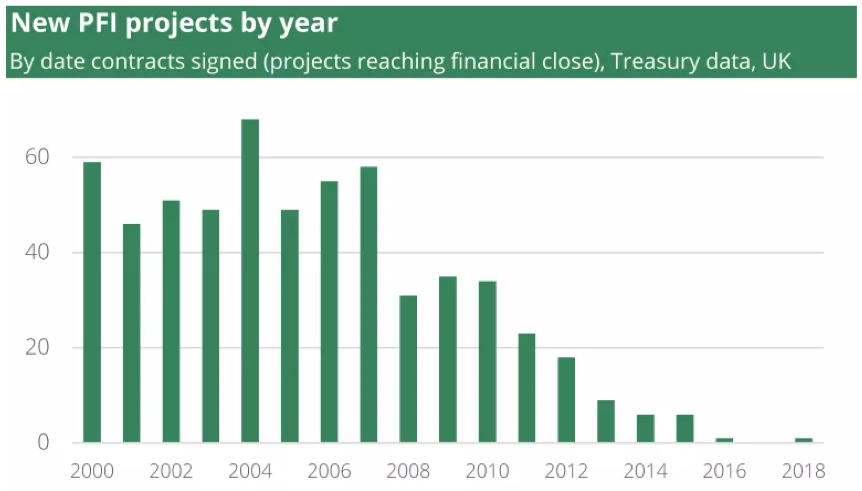Philip Hammond announced in his Budget speech on Monday he would “abolish the use of PFI and PF2 for future projects”.
The Budget document said PFI and its successor PF2 were “inflexible and overly complex”. PF2 had not been used since 2016, it noted.
But John Tizard, who regularly comments on PFI, told PF that the public sector was already rejecting the scheme. [See graph on Treasury data below].
“I think this announcement was more headline than change in practice because there were very few, if any, significant PFI schemes likely to happen in the next couple of years anyway.”
Hammond said in his speech on Monday: “I have never signed off a PFI contract as chancellor and I can confirm today that I never will. I can announce that the government will abolish the use of PFI and PF2 for future projects.”
He also said that the “days of the public sector being a pushover must end” and announced that a centre of excellence would be set up to manage existing contracts.
The centre would start working on PFI projects in the health sector, Hammond explained. It is understood the body will be based in the Department of Health and Social Care.
Tizard suggested that the announcement was designed merely to gain “political plaudits”.
He told PF: “It is already being replaced. Public bodies are borrowing through the Public Works Loan Board or otherwise and employing contractors to build the infrastructure and are separating the infrastructure from the service delivery.”
He added that for a long time public bodies had been “very sceptical of PFI” and warned that the “real challenge is the ongoing debt” of existing PFI contracts, which in some cases will last more than 20 years.
In his Budget speech, Hammond confirmed that the government would honour existing contracts.
Ratings agency S&P Global said that it believed while the government might stop using PFI it will continue to make use of public private partnerships in the future “albeit in a different form”.
The firm said: “The main alternative option, funding all infrastructure on the public balance sheet, does not seem to be on the table.
“The government has kept its options open to continue to use PFI under a different name by stating it remains ‘committed to the use of public private partnership where it delivers value for the taxpayer and genuinely transfers risk to the private sector’”.
Tizard agreed. The government is “still very wedded to the idea of private capital”, he told PF.
The Health Foundation said: ‘‘The chancellor’s announcement of a freeze on PFI leaves the health service with a potential £3bn hole in its capital investment budget. This follows major underinvestment in buildings and infrastructure as capital spending in the NHS has fallen by more than 20% in real terms over the last three years”.
Nick Prior, global head of infrastructure at consultancy firm Deloitte, said the abolition of PFI was a “shock move” as the government “has previously heralded PF2 as a new beginning numerous time over recent years”.
Read former home secretary Charles Clarke’s blog for PF on public-private partnerships.
Graph from the House of Commons library on Treasury PFI data:












